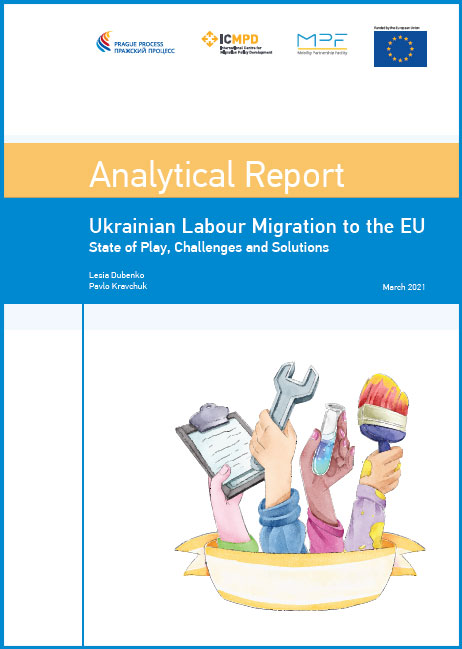Since 2014, the number of Ukrainian labour migrants moving to the European Union (EU) has increased significantly. In 2019 alone, Ukrainian nationals received 660,000 residence permits for remunerated activities across the member states – the largest external labour force in the EU. The reliance of member state economies on workers from Ukraine has thus reached significant levels, as exemplified by the labour shortage seen during the COVID-19 crisis that forced the EU to shut down its borders.
While Ukrainian labour migration to the EU produces economic benefits on both sides, the exchange is beset by multiple challenges. These include limited protection of Ukrainian labour migrants, circumvention of work permit rules, and attempts by unscrupulous actors to lure Ukrainians into accepting precarious or non-existent jobs. This report assesses these challenges and their implications, before providing a set of targeted solutions, ranked according to a Feasibility Score. The proposed solutions range from establishing a ‘one-stop-shop’ for information provision and a joint employment database for non-EU nationals, to launching negotiations on amending the legislation on work permits.
To preview and download the paper please use this link.
Our Repository
- Background Note by Zulfiya Sibagatulina 'Monumental Shifts in Uzbek Labour Migration Policy'
- Analytical Report by Glen Swan 'Building better return and reintegration programs'
- Policy Brief by Anastacia Bobrova 'The EU-Belarus Mobility Partnership: The Way Forward'
- Analytical Report by Irina Molodikova 'Combating irregular migration and human trafficking in the CIS countries'
- Analytical Report by Natalia Husieva et al. 'Internal Displacement in Ukraine: Mapping the Flows and Challenges'
- Background Note by Olga Gulina 'Asylum seekers from the Eastern Partnership and Central Asian Countries in the EU'
- Policy brief by Glen Hodgson "Migration and the Platform Economy"
- Policy brief by Stefan Vogtenhuber "Labour migration from East to West: The example of foreign workers in Austria"
- Policy brief by Haykanush Chobanyan "Armenia's migration cooperation with the European Union and Eurasian Economic Union"
- Policy brief by Rainer Muenz "How will migration to Europe look in the Future? Trends, open questions and four plausible scenarios"
- Policy brief by Ruslan Minich and Pavlo Kravchuk "The Impact of COVID-19 on Ukrainian Labour Migrants in Czechia, Hungary, Poland and Italy"
- Policy brief by Glen Hodgson "Intra-corporate Transferees (ICTs): The benefits for the EU and the opportunity cost"
- Policy brief by Kristof Tamas "Making the EU’s Migration and Development Policies More Coherent"
- Policy brief by Andriy Orlean "Countering Human Trafficking: Identifying, Returning and Assisting Victims from Ukraine"
- Policy brief by Olga Gulina "Russian nationals looking for refuge in the European Union"
- Policy brief by Dmitry Poletaev "Russia’s Migration Policies after the dissolution of the Federal Migration Service"
- Policy Brief by Yan Matusevich "The EU Central Asia Strategy and Its Impact on Migration"
- Policy brief by Kristof Tamas "Assessing the EU's External Migration Policy"
- Training Manual "How to be a good trainer?"
- Policy Brief by Nermin Oruc and Danica Santic "Highly-skilled Return Migrants to the Western Balkans: Should we count (on) them?"
- Analytical Report by Yelena Sadovskaya "China's "Belt and Road" Initiative and Its Impact on Migration Flows and Policies in Central Asia"
- Policy Brief by Petros Aghababyan "Closing the policy gaps concerning an eventual mass influx of asylum seekers to Armenia"
- Policy Brief by Yan Matusevich "Evaluating the Future of Uzbek Labour Migration"
- Analytical Report by Ivanka Heinzl "Report on the National Action Plan to Fight Trafficking in Human Beings of the Republic of Azerbaijan"
- Policy Brief by Haykanush Chobanyan "Assessing Armenia’s Migration Strategy for 2017-2021"
- Policy Brief by Natia Mestvirishvili "Circular Migration Schemes in Georgia"
- Policy Brief by Katerina Ivashchenko-Stadnik "Ukraine: First visa-free year since introducing the visa-free regime"

